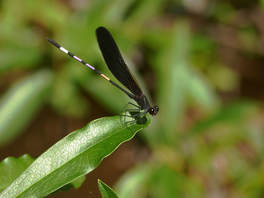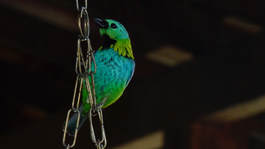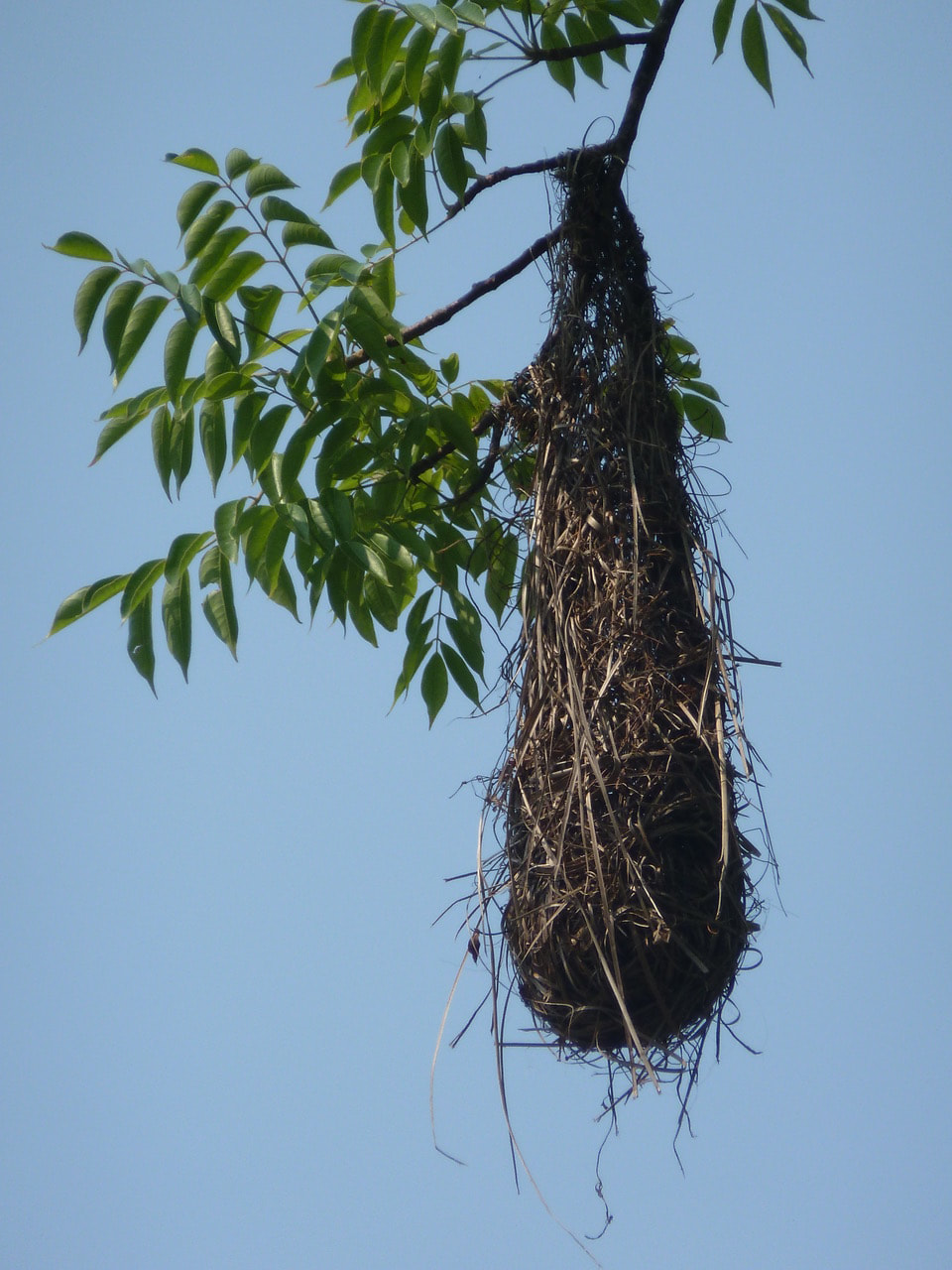
Jonathan Drury
My research focuses on the ways in which competition between species impacts the evolutionary dynamics of traits and coexistence. Specifically, I conduct field research on damselflies to understand how behavioural interference (i.e., costly social interactions between species) influences the evolution of social signalling traits and behaviour. I also study the macroevolutionary impacts of interspecific competition by developing phylogenetic comparative methods. Position: Associate Professor in the Department of Biosciences
Contact details: Department of Biosciences Contact details: Durham University, South Road, Durham DH1 3LE, UK Contact details: Phone: +44 (0) 191 334 1348 Contact details: Email: [email protected] Education
2014 PhD, University of California, Los Angeles 2006 BSc, University of Georgia |
Publications
Drury, J.P., Anderson, C.N., Cabezas Castillo, M.B., Fisher, J., McEachin, S. & Grether, G.F. (2019). A general explanation for the persistence of reproductive interference. The American Naturalist 194(2): 268-275.
Drury, Jonathan, Barnes, Morgan, Finneran, Anne, Harris, Maddie & Grether, Gregory (2019). Continent-scale phenotype mapping using photographs from citizen scientists. Ecography 42(8): 1436-1445.
Harmon, Luke J. Andreazzi, Cecilia S. Débarre, Florence Drury, Jonathan , Goldberg, Emma E., Martins, Ayana B. Melián, Carlos J. Narwani, Anita Nuismer, Scott L. Pennell, Matthew W. Rudman, Seth M. Seehausen, Ole Silvestro, Daniele Weber, Marjorie & Matthews, Blake (2019). Detecting the macroevolutionary signal of species interactions. Journal of Evolutionary Biology 32(8): 769-782.
Grether, G.F., Drury, J.P., Okamoto, K., McEachin, S. & Anderson, C. (2019). Predicting evolutionary responses to interspecific interference in the wild. Ecology Letters
Drury, J.P., Tobias, J.A., Burns, K.J., Mason, N.A., Schultz, A.J. & Morlon, H. (2018). Contrasting impacts of competition on ecological and social trait evolution in songbirds. PLOS Biology 16(1): e2003563.
Drury, J.P., Grether, G.F., Garland Jr., T. & Morlon, H. (2018). An assessment of phylogenetic tools for analyzing the interplay between interspecific interactions and phenotypic evolution. Systematic Biology
Putman, B.J., Drury, J.P., Blumstein, D.T. & Pauly, G.B. (2017). Fear no colors? Observer clothing color influences lizard escape behavior. PLOS ONE 12(8): e0182146.
Drury, J.P., Clavel, J., Manceau, M. & Morlon, H. (2016). Estimating the effect of competition on trait evolution using maximum likelihood inference. Systematic Biology 65(4): 700.
Losin, N., Drury, J.P., Peiman, K.S., Storch, C. & Grether, G.F. (2016). The ecological and evolutionary stability of interspecific territoriality. Ecology Letters 19(3): 260.
Drury, J.P., Okamoto, K.W., Anderson, C.N. & Grether, G.F. (2015). Reproductive interference explains persistence of aggression between species. Proceedings of the Royal Society B: Biological Sciences 282(1804): 20142256.
Drury, J.P. & Grether, G.F. (2014). Interspecific aggression, not interspecific mating, drives character displacement in the wing coloration of male rubyspot damselflies (Hetaerina). Proceedings of the Royal Society B: Biological Sciences 281(1796): 20141737.
Drury, J.P., Anderson, C.N., Cabezas Castillo, M.B., Fisher, J., McEachin, S. & Grether, G.F. (2019). A general explanation for the persistence of reproductive interference. The American Naturalist 194(2): 268-275.
Drury, Jonathan, Barnes, Morgan, Finneran, Anne, Harris, Maddie & Grether, Gregory (2019). Continent-scale phenotype mapping using photographs from citizen scientists. Ecography 42(8): 1436-1445.
Harmon, Luke J. Andreazzi, Cecilia S. Débarre, Florence Drury, Jonathan , Goldberg, Emma E., Martins, Ayana B. Melián, Carlos J. Narwani, Anita Nuismer, Scott L. Pennell, Matthew W. Rudman, Seth M. Seehausen, Ole Silvestro, Daniele Weber, Marjorie & Matthews, Blake (2019). Detecting the macroevolutionary signal of species interactions. Journal of Evolutionary Biology 32(8): 769-782.
Grether, G.F., Drury, J.P., Okamoto, K., McEachin, S. & Anderson, C. (2019). Predicting evolutionary responses to interspecific interference in the wild. Ecology Letters
Drury, J.P., Tobias, J.A., Burns, K.J., Mason, N.A., Schultz, A.J. & Morlon, H. (2018). Contrasting impacts of competition on ecological and social trait evolution in songbirds. PLOS Biology 16(1): e2003563.
Drury, J.P., Grether, G.F., Garland Jr., T. & Morlon, H. (2018). An assessment of phylogenetic tools for analyzing the interplay between interspecific interactions and phenotypic evolution. Systematic Biology
Putman, B.J., Drury, J.P., Blumstein, D.T. & Pauly, G.B. (2017). Fear no colors? Observer clothing color influences lizard escape behavior. PLOS ONE 12(8): e0182146.
Drury, J.P., Clavel, J., Manceau, M. & Morlon, H. (2016). Estimating the effect of competition on trait evolution using maximum likelihood inference. Systematic Biology 65(4): 700.
Losin, N., Drury, J.P., Peiman, K.S., Storch, C. & Grether, G.F. (2016). The ecological and evolutionary stability of interspecific territoriality. Ecology Letters 19(3): 260.
Drury, J.P., Okamoto, K.W., Anderson, C.N. & Grether, G.F. (2015). Reproductive interference explains persistence of aggression between species. Proceedings of the Royal Society B: Biological Sciences 282(1804): 20142256.
Drury, J.P. & Grether, G.F. (2014). Interspecific aggression, not interspecific mating, drives character displacement in the wing coloration of male rubyspot damselflies (Hetaerina). Proceedings of the Royal Society B: Biological Sciences 281(1796): 20141737.



